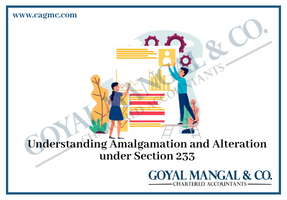| Table of Content |
Meaning of Form DPT 3
DPT–3 form is the statement return which is required to be filed by every company other than a government company and a class of company specify which has accepted deposits under section 73 and rules made thereunder. Generally, every amount accepted from public (including members) is treated as public deposits.DPT-3 is a return of Deposits or of transaction not considered as deposit or both which is to be necessarily filed by every company, other than Government Company. The purpose of this form is to provide information to Registrar of Company about the loan or money received by the Company.

Aim of DPT 3
The Objective of introducing electronic form DPT 3 is to develop a onetime return filling for both disclosure of receipts considered as deposits and for receipts not considered as deposits as per the Companies Act 2013.
Filing of DPT 3
DPT 3 has to file in two ways:
- One time return and
- Annual return
Exempted companies from filling DPT 3
Every company necessarily have to file DPT 3 except a government company must file this return. Additionally, as per Rule 1(3) of the Companies (Acceptance of Deposits) Rules 2014, the following companies are also exempt from filling DPT 3:
- Banking company
- Non-Banking Financial Company
- A housing finance company registered with National Housing Bank
- Any other company as notified under proviso to subsection (1) to section 73 of the Act
Documents to be submitted
- Auditor certificate
- Trust deed
- Copy of instrument creating the charge
- List of depositors-List of deposits matured and cheque issued but not yet cleared to be shown separately
- Optional attachment
Particulars Required to fill form DPT 3
- CIN of company
- E mail ID of company
- Objects of company
- Net worth
- Particulars of charge(if any)
- Total amount outstanding
- Particulars of credit rating
Due date of filling DPT-3
As per rule 16 of the Deposit Rules, yearly return must require to be filed on or before 30th June every year with the registrar. Whereas, as per rule 16A(3) of the Deposit Rules, one-time return was required to be filed within 90 days from March 31st, 2019 of amount outstanding from 1st April 2014 to 31st march 2019 that was June 29th, 2019. The upcoming Due- Date is 30th September, 2020.
Punishment for noncompliance under various sections
Section 73
If the company accepts or invites or allow any deposit in contravention of section 73 or section 76 or rule made thereunder or company fails to repay the amount of deposits with the interest specify under section 73or section 76 or rulechargeable with fine of 1 Crore or twice the amount of deposits (whichever is lower) that may extended to 10 Crore.
Every officer who is in default shall be chargeable with fine of 25,000 to 2 Crore and imprisonment up to 7 years.
Rule 21: Punishment for contravention
On the company and every officer in default a fine which may extend up to 5000, and where the contravention is a continuing one, a fine of 500 for every day since the default.
Fee for DPT 3
Fee for DPT 3 form filing depends on the paid up capital of the company.
| Nominal Share Capital | Fee applicable |
| Less than 1,00,000 | Rupees 200 per document |
| 1,00,000 to 4,99,999 | Rupees 300 per document |
| 5,00,000 to 24,99,999 | Rupees 400 per document |
| 25,00,000 to 99,99,999 | Rupees 500 per document |
| 1,00,00,000 or more | Rupees 600 per document |
Fees for the Companies not having Share Capital the fees will be Rupees 200 per document.
Transactions not considered as deposits
Amount is not considered as deposit in terms of clause (c) of sub-rule 1 of rule 2 of the Companies (Acceptance of Deposits) Rules 2014
- Any amount received from the central or state government or guarantee received by the government, foreign government or foreign Bank.
- Any amount of loan or facility received from any Public Financial Institutions, Insurance Companies or Banks.
- Amount received from one company by the other company.
- Subscription to securities and call in advance.
- Amount received from the director of the company or a relative of the director of the Private Company, who held the positions at the time of lending.
- Amount received by a company from its employee.
- Amount received in the course of, or for the purposes of, the business of the company as an advance for the supply of goods or provision of services or as a security deposit for the performance of the contract for the supply of goods or provision of services.
- Unsecured loans from promoters.
- And any other amount which is not considered as a deposit under Rule 2(1)(c).
Hence any amount whether secured or unsecured which is outstanding money or loan that not considered as deposits must be reported.
Note:-
- Nil return is not required to be filed as clarified by webinar of ICSI dated 17th June 2019;
- Copy of trust deed is Mandatory if the company has a trust deed and details of same are mentioned in the form;







